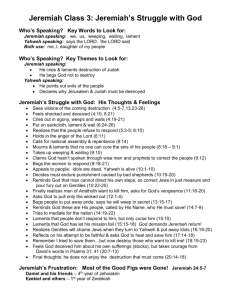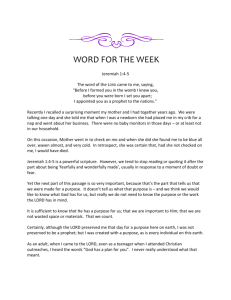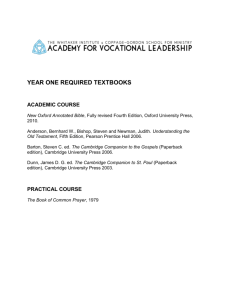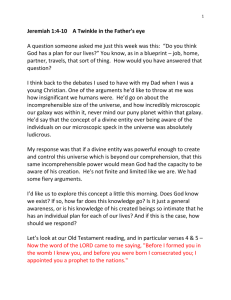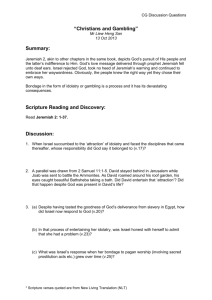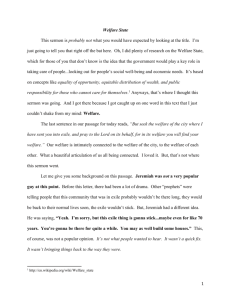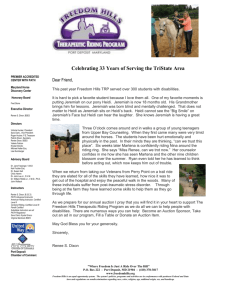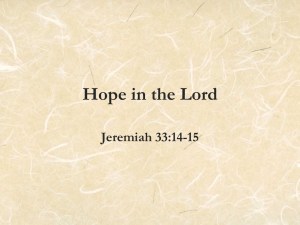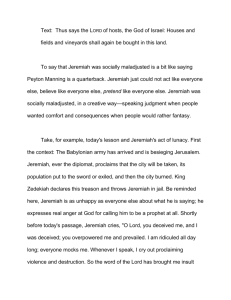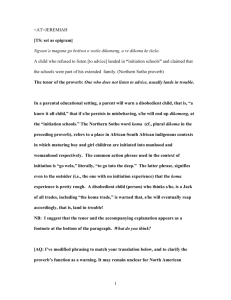Prophets Week 2 – Jeremiah Community Group Discussion Guide
advertisement
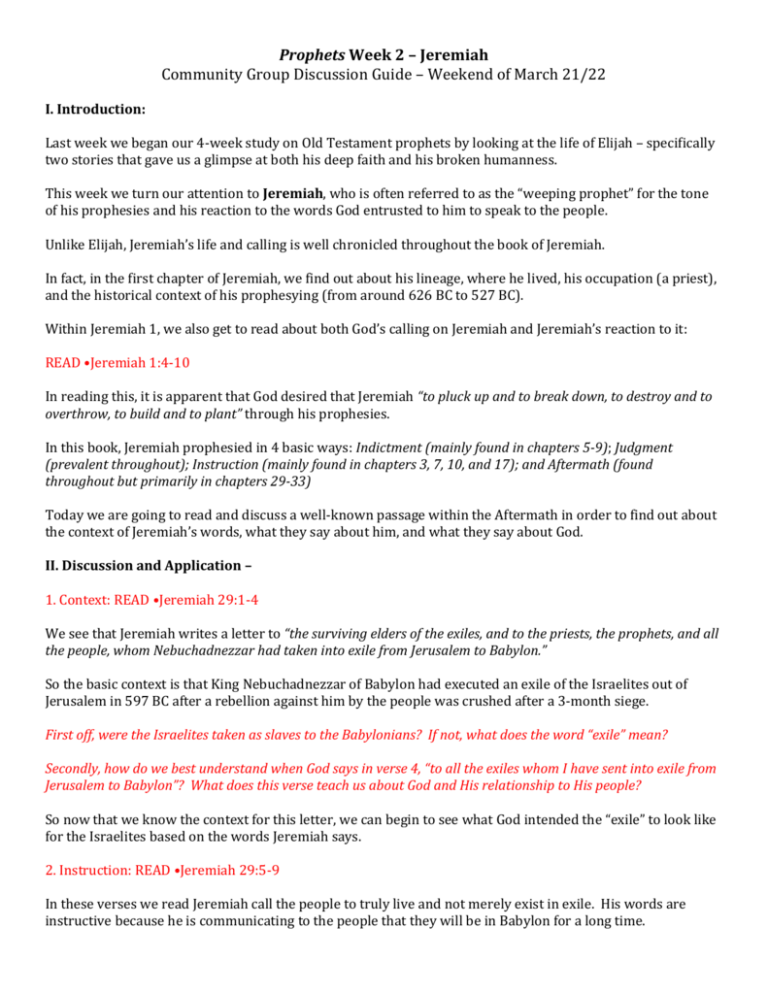
Prophets Week 2 – Jeremiah Community Group Discussion Guide – Weekend of March 21/22 I. Introduction: Last week we began our 4-week study on Old Testament prophets by looking at the life of Elijah – specifically two stories that gave us a glimpse at both his deep faith and his broken humanness. This week we turn our attention to Jeremiah, who is often referred to as the “weeping prophet” for the tone of his prophesies and his reaction to the words God entrusted to him to speak to the people. Unlike Elijah, Jeremiah’s life and calling is well chronicled throughout the book of Jeremiah. In fact, in the first chapter of Jeremiah, we find out about his lineage, where he lived, his occupation (a priest), and the historical context of his prophesying (from around 626 BC to 527 BC). Within Jeremiah 1, we also get to read about both God’s calling on Jeremiah and Jeremiah’s reaction to it: READ •Jeremiah 1:4-10 In reading this, it is apparent that God desired that Jeremiah “to pluck up and to break down, to destroy and to overthrow, to build and to plant” through his prophesies. In this book, Jeremiah prophesied in 4 basic ways: Indictment (mainly found in chapters 5-9); Judgment (prevalent throughout); Instruction (mainly found in chapters 3, 7, 10, and 17); and Aftermath (found throughout but primarily in chapters 29-33) Today we are going to read and discuss a well-known passage within the Aftermath in order to find out about the context of Jeremiah’s words, what they say about him, and what they say about God. II. Discussion and Application – 1. Context: READ •Jeremiah 29:1-4 We see that Jeremiah writes a letter to “the surviving elders of the exiles, and to the priests, the prophets, and all the people, whom Nebuchadnezzar had taken into exile from Jerusalem to Babylon.” So the basic context is that King Nebuchadnezzar of Babylon had executed an exile of the Israelites out of Jerusalem in 597 BC after a rebellion against him by the people was crushed after a 3-month siege. First off, were the Israelites taken as slaves to the Babylonians? If not, what does the word “exile” mean? Secondly, how do we best understand when God says in verse 4, “to all the exiles whom I have sent into exile from Jerusalem to Babylon”? What does this verse teach us about God and His relationship to His people? So now that we know the context for this letter, we can begin to see what God intended the “exile” to look like for the Israelites based on the words Jeremiah says. 2. Instruction: READ •Jeremiah 29:5-9 In these verses we read Jeremiah call the people to truly live and not merely exist in exile. His words are instructive because he is communicating to the people that they will be in Babylon for a long time. In this, Jeremiah is responding to a false prophesy spoken by the prophet Hananiah in Jeremiah 28 when twice he told the people that God would deliver them back to Jerusalem within two years. Because he had prophesied falsely, the Lord – through Jeremiah – told Hananiah of his impending death. However, aside from responding to a false prophecy, why would God desire the Israelites to live and prosper during their time in exile? In what other ways could their prosperity also help the Israelites in their circumstance of being exiled? How is this principle of “blooming where you are planted” applicable to us as believers today? In much the same way, what does this passage (and its context of Hananiah’s false prophecy) teach us about being patient and waiting for God’s plan for our lives? The amazing thing about this letter to the Israelites, however, is that it wasn’t just a letter to tell them to hang in there and wait on God. Instead, Jeremiah spells out God’s promises to His people in exile. 3. Promises: READ •Jeremiah 29:10-14 The first thing we read in verse 10 is how God clearly spells out how long the Israelites will be in Babylon: 70 years, but He also says to them, “I will fulfill to you my promise and bring you back to this place.” If that was all God had chosen to tell the Israelites about his plan, why would that have been more than enough for them to hope in Him? Think on this truth: God did not owe His people anything – they did not deserve and could never have even demanded anything of God. He had the full right to lead them as He sovereignly chose. Yet, God went even further and got even more specific with His promises to these exiled Israelites: 11 For I know the plans I have for you, declares the LORD, plans for welfare and not for evil, to give you a future and a hope. 12 Then you will call upon me and come and pray to me, and I will hear you.13 You will seek me and find me, when you seek me with all your heart. 14 I will be found by you, declares the Lord, and I will restore your fortunes and gather you from all the nations and all the places where I have driven you, declares the LORD, and I will bring you back to the place from which I sent you into exile. First off, in what circumstances or situations do we often quote these verses as modern day believers? However, how does these promises read when put into the context of the history of the Israelites, their inconsistency in their relationship with God, and the fact God said that He sent them into their 70 year exile? So, is it necessarily wrong to apply these principles to our current lives and situations based on their true context? Why or why not? And lastly, what does this entire passage teach us about the God who was the same then as He is now? What can we learn about God from the entirety of the story? Praise God that He does meet the needs of His people, and that His sovereign will is good and perfect for us. Next week we continue the prophet series with Micah.

